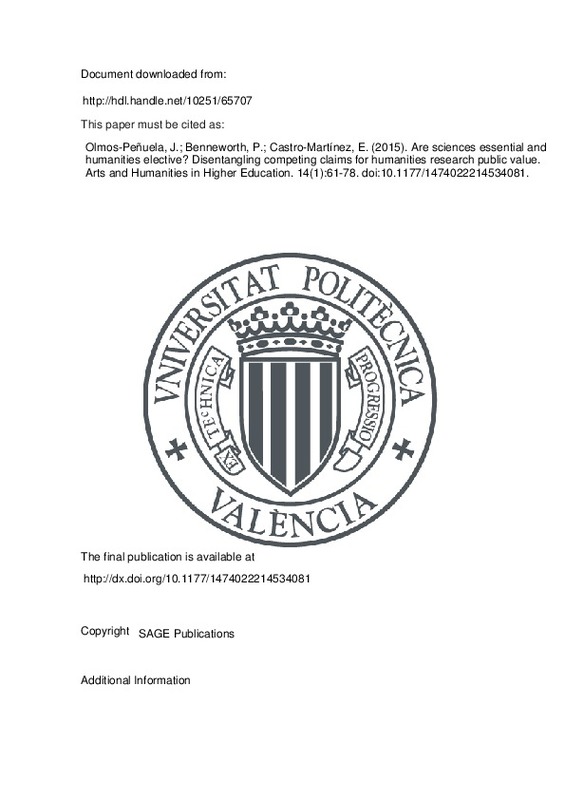JavaScript is disabled for your browser. Some features of this site may not work without it.
Buscar en RiuNet
Listar
Mi cuenta
Estadísticas
Ayuda RiuNet
Admin. UPV
Are sciences essential and humanities elective? Disentangling competing claims for humanities research public value
Mostrar el registro sencillo del ítem
Ficheros en el ítem
| dc.contributor.author | Olmos-Peñuela, Julia
|
es_ES |
| dc.contributor.author | Benneworth, Paul
|
es_ES |
| dc.contributor.author | Castro-Martínez, Elena
|
es_ES |
| dc.date.accessioned | 2016-06-13T07:40:35Z | |
| dc.date.available | 2016-06-13T07:40:35Z | |
| dc.date.issued | 2015-02 | |
| dc.identifier.issn | 1474-0222 | |
| dc.identifier.uri | http://hdl.handle.net/10251/65707 | |
| dc.description.abstract | [EN] Recent policy discourse suggests that arts and humanities research is seen as being less useful to society than other disciplines, notably in science, technology, engineering and mathematics. The paper explores how this assumption s construction has been built and whether it is based upon an unfair prejudice: we argue for a prima facie case to answer in assuming that arts and humanities research s lower societal value. We identify a set of claims circulating in policy circles regarding science, technology, engineering and math- ematics research and arts and humanities research s differences. We find two groups: arts and humanities research is less useful than science, technology, engineering and mathematics, and arts and humanities research is merely differently useful. We argue that empirical analysis is necessary to disentangle which ones are true to assess whether policy-making is being based on rational and evidence-based claims. We argue that debates about public research value should recognise that humanities have different (but equally valid) kinds of societal value. | es_ES |
| dc.description.sponsorship | This work was supported by the Spanish Ministry of Education, which funded the PhD research fellowship of Julia Olmos Peñuela through the F.P.U program [AP2007- 01850]. The research fellowship took place in the framework of the HERAVALUE project, Measuring the public value of arts and humanities research, financially supported by the HERA Joint Research Programme, cofunded by AHRC, AKA, DASTI, ETF, FNR, FWF, HAZU, IRCHSS, MHEST, NWO, RANNIS, RCN, VR and The European Community FP7 2007-2013, under the Socio-economic Sciences and Humanities programme. The authors would like to thank the editors and two anonymous referees for their invaluable comments. Any errors or omissions remain the authors’ responsibilitie | |
| dc.language | Inglés | es_ES |
| dc.publisher | SAGE Publications | es_ES |
| dc.relation.ispartof | Arts and Humanities in Higher Education | es_ES |
| dc.rights | Reserva de todos los derechos | es_ES |
| dc.subject | Arts | es_ES |
| dc.subject | Humanities | es_ES |
| dc.subject | Public value | es_ES |
| dc.subject | Research policy | es_ES |
| dc.subject | Research | es_ES |
| dc.subject | Societal value | es_ES |
| dc.subject.classification | ORGANIZACION DE EMPRESAS | es_ES |
| dc.title | Are sciences essential and humanities elective? Disentangling competing claims for humanities research public value | es_ES |
| dc.type | Artículo | es_ES |
| dc.identifier.doi | 10.1177/1474022214534081 | |
| dc.relation.projectID | info:eu-repo/grantAgreement/MEC//AP2007-01850/ES/AP2007-01850/ | |
| dc.rights.accessRights | Abierto | es_ES |
| dc.contributor.affiliation | Universitat Politècnica de València. Instituto de Gestión de la Innovación y del Conocimiento - Institut de Gestió de la Innovació i del Coneixement | es_ES |
| dc.description.bibliographicCitation | Olmos-Peñuela, J.; Benneworth, P.; Castro-Martínez, E. (2015). Are sciences essential and humanities elective? Disentangling competing claims for humanities research public value. Arts and Humanities in Higher Education. 14(1):61-78. https://doi.org/10.1177/1474022214534081 | es_ES |
| dc.description.accrualMethod | S | es_ES |
| dc.relation.publisherversion | http://dx.doi.org/10.1177/1474022214534081 | es_ES |
| dc.description.upvformatpinicio | 61 | es_ES |
| dc.description.upvformatpfin | 78 | es_ES |
| dc.type.version | info:eu-repo/semantics/publishedVersion | es_ES |
| dc.description.volume | 14 | es_ES |
| dc.description.issue | 1 | es_ES |
| dc.relation.senia | 266607 | es_ES |
| dc.contributor.funder | Ministerio de Educación y Ciencia |







![[Cerrado]](/themes/UPV/images/candado.png)

